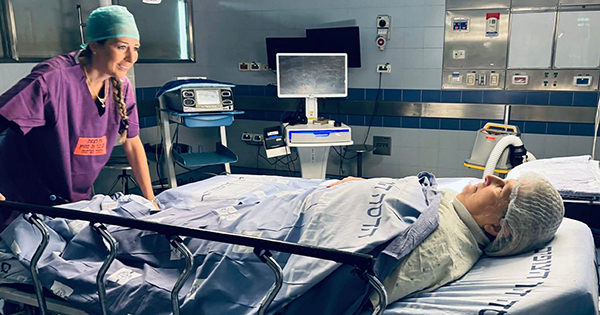
JERUSALEM – Patients in a first-of-its-kind weight-loss study at Israel’s Hadassah Medical Organization lost an average of 10 percent of their body weight after undergoing a new therapy that uses hypnosis to simulate gastric sleeve surgery but requires neither incisions nor anesthesia. The results are comparable to those achieved through actual gastric sleeve surgery and many approved weight-loss drugs.
Preliminary findings show that only three months after 41 participants underwent the simulated operation, 86 percent have continued to lose weight. Of those who had had weight loss surgery and regained weight, 66 percent lost more than 20 percent of their excess pounds while 55 percent of those who had never had such surgery achieved a similar outcome.
"This is a perfect example of the Hadassah Medical Organization’s focus on finding innovative, evidence-based approaches to medicine’s toughest challenges,” said Yoram Weiss, MD, Director General. “This groundbreaking study demonstrates how psychological insight and medical expertise can come together to open new paths to healing."
The simulated operations were part of a study being conducted by a multidisciplinary team of Hadassah physicians: head of general and endocrine surgery Hagai Mazeh, MD; senior bariatric surgeon Ronit Greenbaum, MD; psychiatrist Yorai Tal Ron, MD; and Tamar Elram, MD, director of Hadassah’s Mount Scopus campus, where the study is taking place. They were joined by Danny Ben-Zvi, PhD, a professor at the Hadassah-Hebrew University School of Medicine and director of Hebrew University’s metabolism and diabetes research laboratory, and psychiatrist and medical hypnosis specialist Eitan Abramowitz, MD, of the Hypno-Campus Institute of Medical Hypnotherapy.
The study is being led by psychologist and licensed hypnotherapist Maya Mizrahi, who developed the therapy.
Gastric sleeve surgery works by reducing the stomach to a narrow “sleeve” that limits food intake and increases satiety. Hadassah’s research team has recreated this experience through hypnosis and guided visualization.
During the 50-minute procedure, patients enter a hypnotic state. Guided through each step of what would be gastric sleeve surgery as if it were actually happening, they vividly imagine every stage of the operation, believing themselves to be undergoing a physical change. The mental simulation activates feelings of fullness, self-control and motivation, which support long-term weight loss.
As in real operations, patients wear surgical gowns and are connected to a needle-less IV and monitors that check heart rate and blood pressure.
"Hypnosis is not a magic trick,” said Mizrahi. “The goal is not only to create a surgical experience but also to strengthen the patients' sense of capability and teach them to listen to their bodies."
As part of the study each participant completes six sessions, including preparation, the simulated surgery and guided self-hypnosis practice. They receive in-person and monthly phone support for a year as well as periodic blood tests to check levels of ghrelin and leptin, hormones associated with hunger and fullness. They also receive nutritional guidance similar to that given after real surgery.
The study is ongoing, with final results expected within a year. Researchers hope it will offer a non-invasive option for patients who regain weight after surgery and those seeking an alternative to it.
# # #
About the Hadassah Medical Organization:
For more than a century, the Hadassah Medical Organization, the Jerusalem-based medical center of Hadassah, The Women’s Zionist Organization of America, has set the standard for excellence in medical treatment and research in Israel. The experience and ingenuity of Hadassah’s doctors and scientists have led to new tools and treatments in all areas of medicine, including therapeutics, diagnostics and medical devices. Visit hadassah.org/how-we-help/our-hospitals.



.svg)